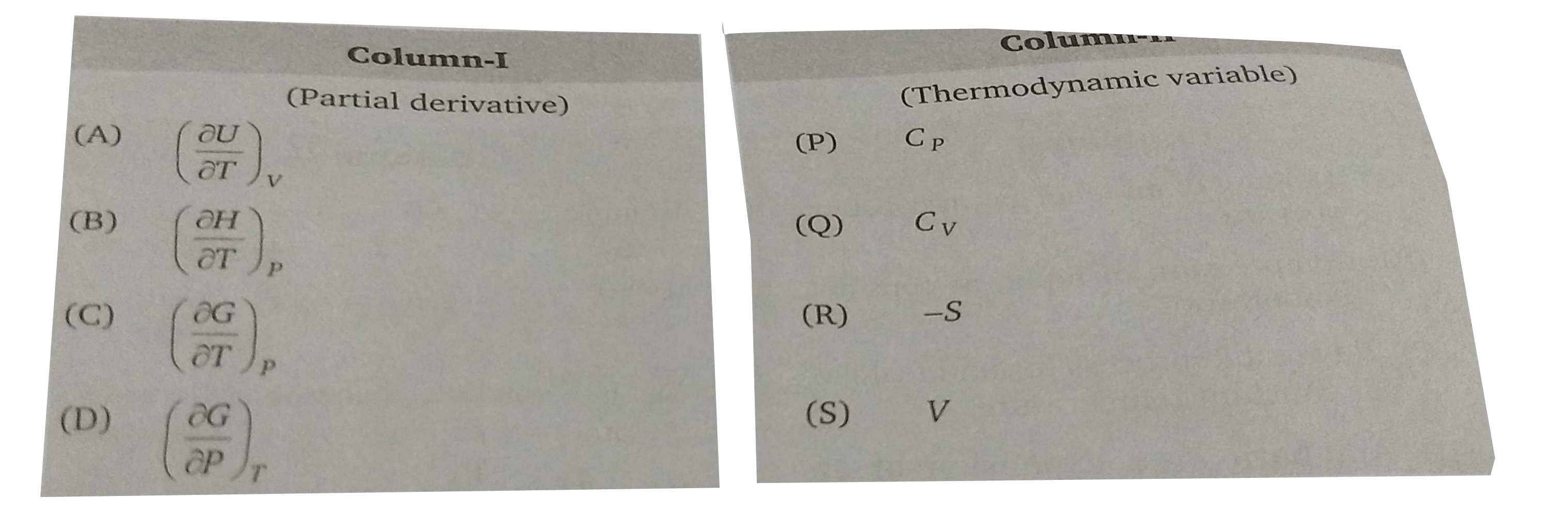Select correct statement(s) for the reaction H2O(g)+CO(g)→H2(g)+CO2(g) substance
CO(g) CO2(g) H2O(g) H2(g)
ΔfH∘400(kcal mol−1) -25 -95 -55 0
S∘400(cal mol−1K−1) 45 50 40 30Solution in Punjabi
Reaction is enthalpy driven
Reaction is entropy driven
Reaction is spontaneous at 400 K
Reaction is non-spontaneous at 400 K
The correct Answer is:A, C
ΔH=−ve Enthalpy driven
ΔS=+ve Entropy driven
ΔG=−ve Spontaneous process
ΔG=+ve Non spontaneous process
Topper's Solved these Questions
- THERMODYNAMICSBOOK - NARENDRA AWASTHICHAPTER - THERMODYNAMICSEXERCISE - Level 3 - One Or More Answers Are Correct
1 Videos
- THERMODYNAMICSBOOK - NARENDRA AWASTHICHAPTER - THERMODYNAMICSEXERCISE - Level 3 - Match The Column
2 Videos
- THERMODYNAMICSBOOK - NARENDRA AWASTHICHAPTER - THERMODYNAMICSEXERCISE - Level 2 (Q.1 To Q.30)
1 Videos
- STOICHIOMETRYBOOK - NARENDRA AWASTHICHAPTER - STOICHIOMETRYEXERCISE - Level 3 - Subjective Problems
20 Videos
Similar Questions
Assume ideal gas behaviour for all the gases considered and neglect vibrational degrees of freedom. Separate equimolar sample. Separate equimolar samples of Ne, O2 , CO2 and SO2 were subjected to a two process as mentioned. Initially all are at same state of temperature and pressue.
Step I → All undergo reversible adiabatic expansion to attain same final volume, which is double the original volume thereby causing the decreases in their temperature.
Step → After step I all are given appropriate amount of heat isochorically to restore the original temperature.
Mark the correct option(s) :
View SolutionMatch the following columns

View SolutionWrite structure of 2,2-dimethylheptane.
View SolutionWhat volume of a liquid (in L) will contain 10 mole ? If molar mass of liquid is 280 and its density is 1.4 g/mL.
View SolutionΔ∘f for CO2(g),CO(g) and H2O(g) are −393.5,−110.5 and −241.8kJmol−1 respectively. The standard enthalpy change ( in kJ) for given reaction is :
CO2(g)+H2(g)→CO(g)+H2O(g)
View SolutionΔH∘1 for CO2(g), CO(g) and H2O(g) are −393.5,−110.5 and −241.8kJmol−1 respectively. Standard enthalpy change for the reacion
CO2(g)+H2(g)→CO(g)+H2O(g) is
View SolutionThe DeltaH_(f)^(@) for CO_(2)(g) , CO(g) and H_(2)O(g) are -395.5,-110.5 and -241.8" kJ" mol^(-1) respectively. The standard enthalpy change in (in kJ) for the reaction CO_(2)(g)+H_(2)(g)toCO(g)+H_(2)O(g) is
View SolutionSelect correct statement(s) for the reaction H2O(g)+CO(g)→H2(g)+CO2(g) substance
CO(g) CO2(g) H2O(g) H2(g)
ΔfH∘400(kcal mol−1) -25 -95 -55 0
S∘400(cal mol−1K−1) 45 50 40 30
View Solutionthe DeltaH_(t)^(@)for CO_(2)(g) , CO(g) and H_(2)O(g) are -393.5 , -110.5 and -241.8 kJ mol ^(-1) respectively, the standed enthalpy change ( in kJ) for the reaction CO_(2)(g)+ H_(2)(g)to CO(g) + H_(2)O(g) is
View SolutionFrom the given table answer the following question:
CO(g)CO2(g)H2O(g)H2(g)ΔH∘298(−KCal/mole)−26.42−94.05−57.80ΔG∘298(−KCal/mole)−32.79−94.24−54.640S∘298(−Cal/k mol)47.351.1?31.2
Reaction:H2O(g)+CO(g)⇔H2(g)+CO2(g)
Calculate S∘298[H2O(g)]
View SolutionThe DeltaH_(f)^(@) for CO_(2)(g), CO(g) and H_(2)O(g) are - 393.5, - 110.5 and - 241.8 kJ mol^(-1) respectively. The standard enthalpy change (in kJ) for the reaction CO_(2)(g)+H_(2)(g)rarrCO(g)+H_(2)O(g) is
View SolutionCalculate ΔH∘f for the reaction CO2(g)+H2(g)→CO(g)+H2O(g) given that ΔH0f for CO2(g),CO(g) and H2O(g) are -393.5 , -111.31 and −242kJ mol−1 respectively.
View SolutionFrom the following data at 25^(@) C {:("Reaction" ,, Delta_(r) H^(@) kJ//mol) , ((1)/(2) H_(2) (g) + (1)/(2) O_(2) (g) to OH (g) ,, 42), (H_(2) (g) + (1)/(2) O_(2) (g) to H_(2) O (g) ,, -242), (H_(2) (g) to 2 H (g) ,, 436) , (O_(2) (g) to 2 O(g) ,, 495):} Which of the following statement(s) is/are correct : Statement(a) : Delta_(r) H^(@) for the reaction H_(2) O (g) to 2 H(g) + O(g) is 925 kJ/mol Statement (b) : Delta_(r) H^(@) for the reaction OH(g) to H_(2) (g) + O(g) is 502 kJ/mol Statement(c) : Enthalpy of formation of H(g) is – 218 kJ/mol Statement(d) : Enthalpy of formation of OH(g) is 42 kJ/mol
View SolutionCalculate delta H_(r)^(0) for the reaction CO_(2)(g) + H_(2)(g) rarr CO(g) + H_(2)O(g) given that Delta H_(r)^(0) for CO_(2) (g), CO (g) and H_(2)O (g) are - 393.5, -111.31 and - 242 KJ mol^(-1) respectively.
View SolutionCalculate Delta_(f)H^(@) for the reaction, CO_(2)(g) + H_(2)(g) to CO(g) + H_(2)O(g) Given that Delta_(f)H^(@) for CO_(2)(g) , CO(g) and H_(2)O(g) are -393.5, -111.3 and -241.8 kJ mol^(-1) respectively.
View SolutionThe ΔH∘ for CO2(g),CO(g) and H2O(g) are -393.5, -110.5 and −241.8kJmol−1 respectively.The standard enthalpy change (in kJ) for the reaction :
CO2(g)+H2(g)→CO(g)+H2O(g) is
View Solution
